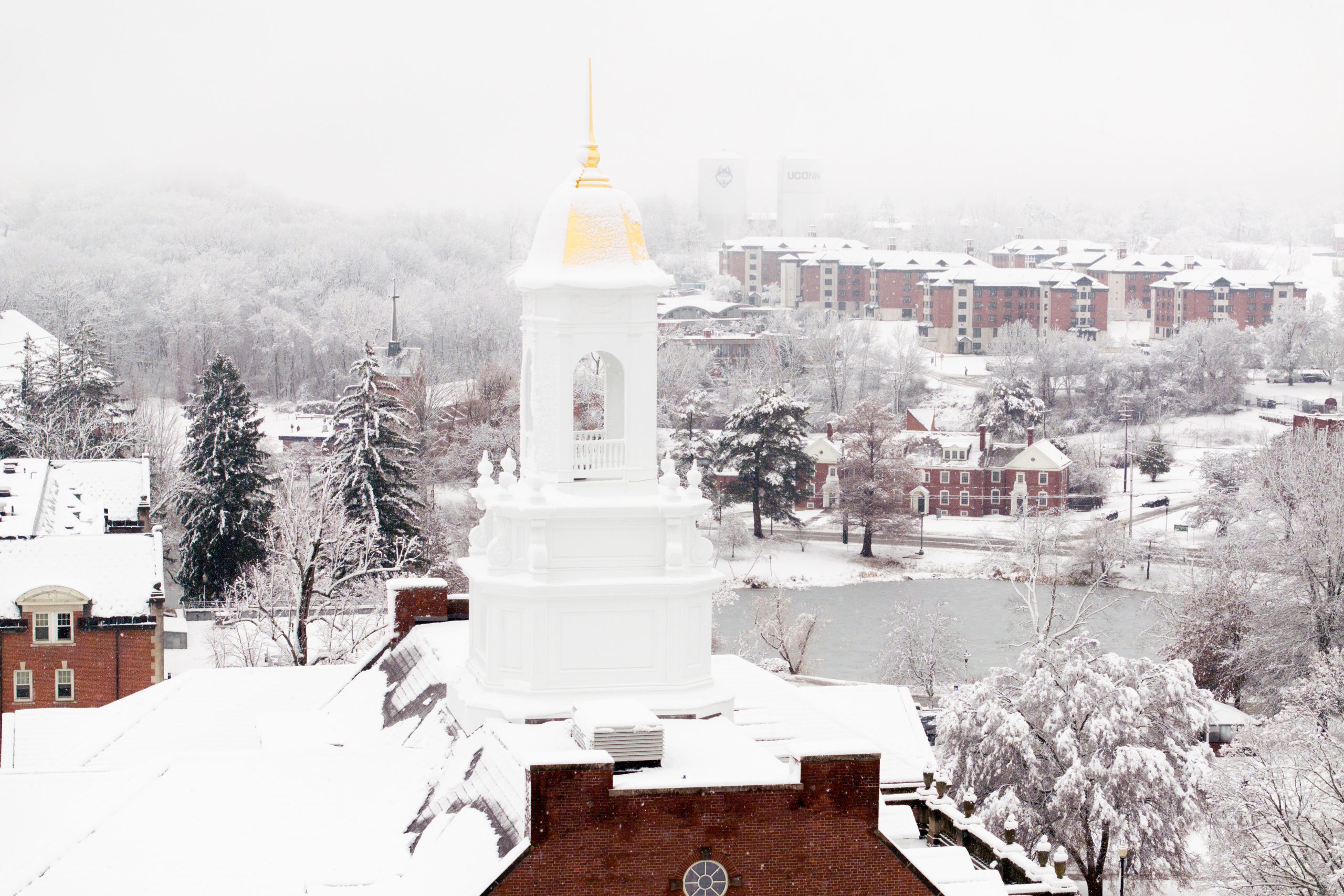Scott Brohinsky, who served more than two decades at UConn in roles that were critical to its transformation into a national model of excellence in higher education, has been awarded the University’s most prestigious honor.
The Board of Trustees voted unanimously at its last meeting to bestow the University Medal on Brohinsky ’76 JD for serving “with great distinction, leadership, and loyalty” leading UConn’s governmental relations functions for 19 years and, later, as head of University Communications.
In total, Brohinsky served for 21 years at the University, and continued after his 2009 retirement as an active volunteer and advocate, including by rallying support for the Next Generation Connecticut initiative approved by the General Assembly in 2013.
“Scott’s tenure had a lasting and transformative effect on the University and directly impacted its meteoric rise in the national rankings,” UConn trustee Thomas Ritter wrote to the Committee on Honors and Awards, which unanimously approved the nomination earlier this month.
“Scott’s contributions to the University are so profound and meaningful that I urge you to give him every possible consideration for the University Medal,” Ritter wrote. “His accomplishments speak for themselves and I can think of no one more deserving.”
Brohinsky will be honored at an event being planned for September. He thanked the trustees at their recent meeting and praised the collective efforts of people inside and outside of UConn.
“UConn is a special institution,” he said. “The faculty, staff, administrators, along with our alums, students, parents, and volunteers — we all share a fundamental belief in UConn’s mission and a sense of pride and emotional attachment to this university.
“It was a privilege to advocate for and behalf of UConn, and an honor to play a role to help the university achieve its mission and enhance our state’s connection and investment in UConn,” he added.
Other trustees echoed Ritter’s praise, saying Brohinsky envisioned and championed UConn as a future leader in higher education at the national level long before many others thought it was possible or feasible.
They noted that before the mid-1990s, UConn was viewed as a place that offered a solid education but was hampered by its rundown flagship campus, outdated facilities, and the impression those shortcomings left on potential students and others.
UConn’s leaders had little say about its budget, hiring decisions, purchasing, replacing outdated facilities, and other key decisions. That authority rested only with the General Assembly, not with those who worked at the University and best knew its needs and potential, Brohinsky reflected Wednesday during the trustees’ meeting.
“Fundamentally what they didn’t understand is that higher education, and in particular the flagship public research university, exists in a competitive environment distinct from all other state agencies,” Brohinsky said.
“We compete for students, we compete for faculty and administrative leadership, we compete for research grants, we compete for philanthropy, and we even compete for state investments … One only needed to visit the campus at that time to see the ramifications of the lack of authority and decision-making at the University.”
Starting in the early 1990s and continuing throughout his career, Brohinsky worked with state legislators – including Ritter when he was Speaker of the House – along with governors, alumni, philanthropic supporters, and many other constituencies to raise UConn’s profile and successfully advocate for more local fiscal and managerial authority.
Before coming to UConn, Brohinsky worked for nine years at the Connecticut Department of Education, with seven of those years as legislative assistant to its commissioner and two years as the department’s deputy commissioner.
He joined UConn as its director of governmental relations and later became director of university relations, which served as an umbrella for UConn’s communications, governmental relations, events and conference services, and alumni affairs offices.
Through those roles, Brohinsky was a key player in envisioning, formulating and promoting UConn 2000, the state’s massive 10-year, $1 billion investment program approved in 1995 to overhaul the University’s infrastructure; and its second iteration, 21st Century UConn, which was approved in 2002 and carried $1.5 billion in capital improvement funding.
Even after his retirement, he lent his unflagging support and efforts for the current Next Generation Connecticut program, which went into effect in 2014 and has funded the downtown Hartford campus, the Peter J. Werth Residence Tower, the under-construction Science 1 Complex, and many other projects.
In the early 1990s, when Brohinsky arrived at UConn, applications averaged about 10,000 yearly. Students who selected other institutions consistently reported back in surveys that the poor state of UConn’s campuses and infrastructure played a role in their decisions.
But as campus facilities improved in the time since UConn 2000 was launched, student applications and faculty interest skyrocketed as it was able to offer more modern and appropriate space for teaching, research and student life. UConn also saw corresponding increases in the quality of the applicants, the ability to compete for research funding, and strong partnerships with other state agencies, alumni, and the business community.
Under Brohinsky’s leadership, the University Communications office also started its work with the Division of Enrollment Planning and Management to align ways in which they present the University’s attributes to potential students and other guests, including through publications and the Lodewick Visitors Center, which opened in summer 2000.
Buoyed by the modern academic, research, and student housing attributable to UConn 2000, its successors, and the other initiatives, more than 38,000 students applied for admission for the incoming Class of 2025. That was a record-high level of interest despite the unpredictability created by the COVID-19 pandemic worldwide, and almost four times the number of applications received annually in the early 1990s when Brohinsky and others started their push to transform the University.
“Scott’s efforts provided the fundamental building blocks that enabled UConn’s ascension to the top tier of public universities,” Ritter wrote in nominating Brohinsky for the University Medal.
Brohinsky joins a select group of people to have received the University Medal for extraordinary service, including Ritter.
Some of the others include Donald “Dee” Rowe, longtime Athletic Director and former UConn Men’s Basketball coach; Reuben “Ben” Bostford Johnson, the longtime Dean of Men and alumni relations director; Lewis Rome, a longtime UConn Board of Trustees chairman and a former state senator; and other alumni, philanthropic supporters, and employees like Brohinsky whose loyalty and leadership were extraordinary.
As a member of a family whose careers have all been in education and child development, Brohinsky said he and others aspired to “simply do good and make lasting contributions.”
“This recognition confirms that I just may have done that at UConn,” he said of the University Medal, “and for that, I am extremely grateful.”


